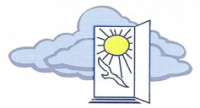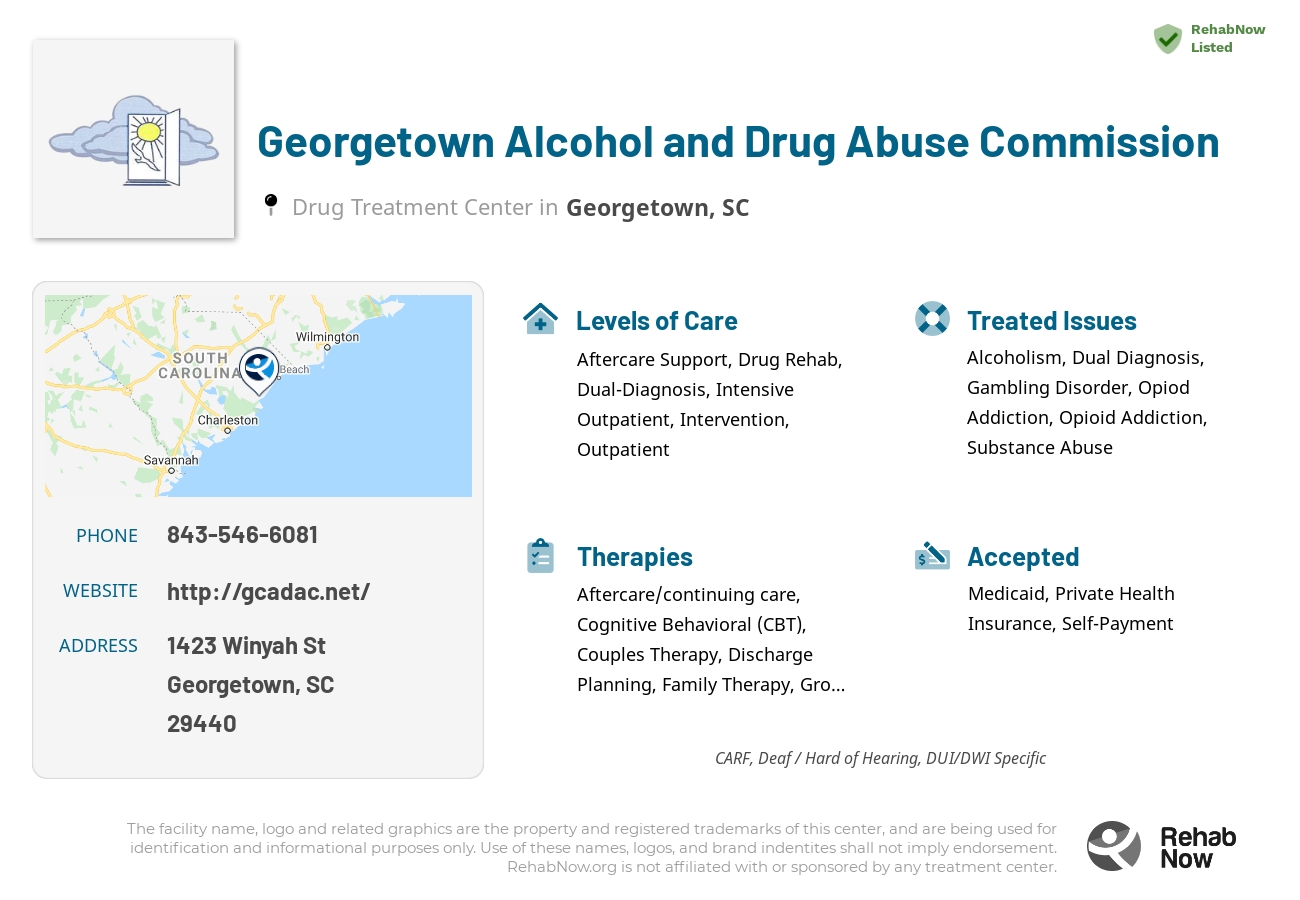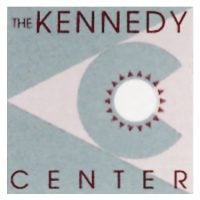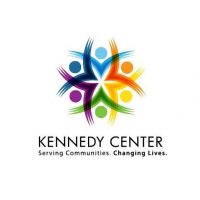Georgetown Alcohol and Drug Abuse Commission
Drug Rehab Center in Georgetown, South Carolina
Georgetown Alcohol and Drug Abuse Commission provides prevention, education, and rehabilitation services for individuals and families dealing with substance use disorder and addiction, offering a range of treatment services including assessments, individual counseling, intensive outpatient programs, and aftercare, and is licensed and accredited for their outstanding services.
About This Georgetown, SC Facility
The Georgetown Alcohol and Drug Abuse Commission (GCADAC) is located in the historic city of Georgetown, South Carolina. This non-profit organization specializes in providing comprehensive, evidence-based treatment and recovery services for individuals struggling with substance abuse and addiction.
- Trauma-informed care approach tailored to individual needs
- Variety of services including counseling, classes, and therapy
- Safe and supportive environment for recovery
GCADAC embraces its role as the county authority on substance abuse, undergoing state licensing and national CARF accreditation to ensure high-quality services. Their mission is to assist the community with taking the "First step in building a brighter Future."
GCADAC offers treatment for various addictions, utilizing methods such as individual and group counseling, psycho-educational classes, case management, family and recreational therapy, and medication-assisted treatment. Services span different levels of care to meet each person's unique needs.
Genders
Ages
Modality
Additional
Accreditations
State License

CARF
The Commission on Accreditation of Rehabilitation Facilities (CARF) is a non-profit organization that specifically accredits rehab organizations. Founded in 1966, CARF's, mission is to help service providers like rehab facilities maintain high standards of care.
Conditions and Issues Treated
Using both legal medications and illegal substances in order to maintain an addiction is substance abuse. Illegal substances can become addictive after a single use. If you are obtaining legal medications illegally, you may be suffering from substance abuse.
Fortunately facilities like Georgetown Alcohol and Drug Abuse Commission in Georgetown, SC are here to help.
Opioid addiction treatment facilities in South Carolina, like Georgetown Alcohol and Drug Abuse Commission cover both illegal and prescription opioids abuse. Most plans include detoxification and subsequent medications to ease the process. Behavioral therapies and counseling are also necessary to resolve the root cause of addiction.
When someone in South Carolina struggles with both addiction and mental or emotional illness, this is considered a dual diagnosis. Dual diagnosis treatment can include emotional trauma, bipolar disorder, schizophrenia, depression. Getting treatment for these issues must occur at the same time to treat either of them effectively.
Levels of Care Offered
This center offers a variety of custom treatment tailored to individual recovery. Currently available are Aftercare Support, Drug Rehab, Dual-Diagnosis, Intensive Outpatient, Intervention, Outpatient, with additional therapies available as listed below.
An intensive outpatient treatment program is set up for those struggling with an addiction to begin the recovery process. Patients come to Georgetown, SC to Georgetown Alcohol and Drug Abuse Commission for therapy, support, programs, and medical supervision. Intensive outpatient treatment is often very tightly scheduled and heavily structured.
Intervention services are designed to help loved ones of an individual suffering from alcohol or drug addiction. They aim to help the individual realize that their behavior is causing damage, and external help is crucial to handle their problem efficiently.
Treatment for substance abuse does not cease after an individual successfully completes a detox or rehabilitation program. A vital follow-up treatment service is aftercare support provided to individuals at Georgetown Alcohol and Drug Abuse Commission in South Carolina after they attain initial sobriety.
Aftercare support often takes the following forms: 12-Step Programs, Outpatient Treatment Programs, and Support Groups. The most effective aftercare programs are tailored to meet an individual’s specific needs and circumstances.
Georgetown Alcohol and Drug Abuse Commission‘s Therapies & Programs
Treatment programs include individual therapy for the greatest chances of success. Customized individual therapy is counseling involving you and your Georgetown Alcohol and Drug Abuse Commission counselor. Individual therapy leads to greater peace and understanding about your triggers for addiction.
Spousal relationships bear the brunt of alcohol and drug dependence. It becomes critical to submit the relationship to couples therapy to prevent straining it further. Some facilities like Georgetown Alcohol and Drug Abuse Commission in Georgetown, SC offer couples therapy options to manage intimate partnerships amid the recovery process. Other couples-focused treatment plans can provide the patient and their partner tools to get things back to normal.
When family members are more proactive and involved in the treatment procedure, it encourages the patient to advance his or her progress. Moreover, it shouldn’t be ignored that genetics play a role when it comes to addiction, so it’s better to approach the problem as a unit. Also, with proper education, family members can help an individual avoid addiction triggers and guide him or her in making lifestyle changes necessary for his or her sobriety.
It has been said that unhealed trauma is the root of most addictions. Trauma therapy is a way of addressing trauma while in a safe situation in order to heal. Healing past traumas and introducing coping strategies are strong foundations for sustained recovery from addiction. This may involve individual or group counseling or both, in a Georgetown, SC facility. Other forms of therapy have been proven to assist in healing past traumas.
Cognitive Behavioral Therapy (CBT) is a type of psychotherapy that focuses on the underlying thoughts and behaviors that caused the problem of addiction in the first place and may cause a relapse. Negative feelings are common in substance abuse disorders, and if not recognized, they can cause co-occurring disorders.
CBT involves strategies that help to change the thinking and behavioral pattern by cognitive restructuring. In simple terms, it helps to remove negative thoughts and provides long-term benefits. Also, CBT promotes self-awareness, self-control, and healthy ways to respond to negative thoughts. It can be administered as a mono-therapy as well as a part of combination therapy.
In the midst of an addiction certain healthy habits and behaviors can be forgotten or discarded altogether. While in treatment you will learn life skills that will help you successfully maintain sobriety and rebuild your life in Georgetown, SC. Some examples of this are time management, social skills, nutrition, hygiene, stress management and taking care of yourself.
Payment Options Accepted
For specific insurance or payment methods please contact us.
Is your insurance accepted?
Ask an expert, call (888) 674-0062
Additional Details
Specifics, location, and helpful extra information.
Georgetown, South Carolina 29440 Phone Number(843) 546-6081 Meta DetailsUpdated April 15, 2024
Staff Verified
Patient Reviews
There are no reviews yet. Be the first one to write one.
Georgetown, South Carolina Addiction Information
More than 610,000 of South Carolina residents, or a staggering 11.9% of the state population, uses illicit drugs and another 230,000 residents abuse alcohol every year. A majority of the illegal drugs used and abused are opioids. Marijuana use and underage drinking occur amongst the young residents of this state–though at a lower rate compared to the national average.
Marijuana is now the most commonly used illicit drug in Georgetown, South Carolina. In 2019, over 61% of drug-related arrests in the city were for marijuana possession. Only 1 in 10 people with a drug addiction receive treatment. The city has been working hard to combat the problem, but it remains a serious concern. Rehab centers in Georgetown offer support and information for those affected by addiction.
Treatment in Nearby Cities
- Marion, SC (56.2 mi.)
- Abbeville, SC (186.0 mi.)
- Barnwell, SC (119.8 mi.)
- Rock Hill, SC (146.3 mi.)
- Ruby, SC (107.9 mi.)
Centers near Georgetown Alcohol and Drug Abuse Commission
The facility name, logo and brand are the property and registered trademarks of Georgetown Alcohol and Drug Abuse Commission, and are being used for identification and informational purposes only. Use of these names, logos and brands shall not imply endorsement. RehabNow.org is not affiliated with or sponsored by Georgetown Alcohol and Drug Abuse Commission.













